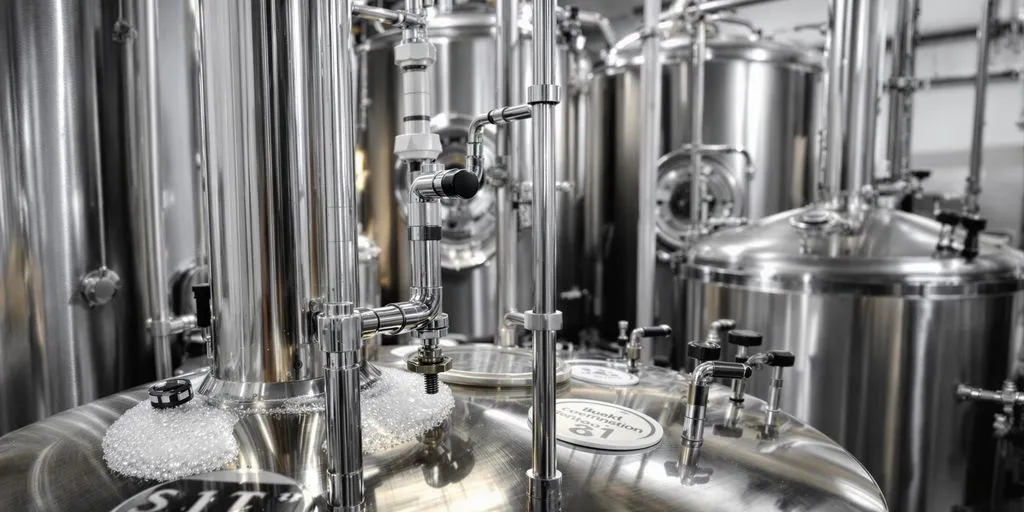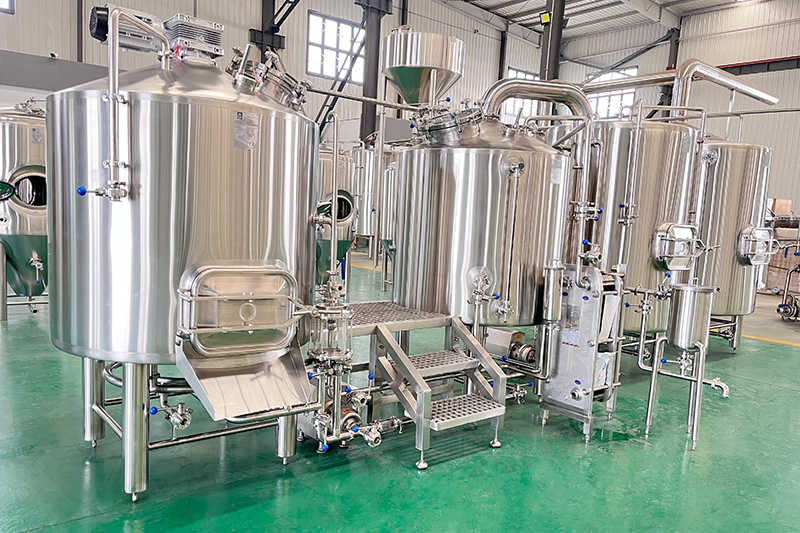Brewing beer at home is not only fun but also lets you create flavors you can’t find anywhere else. This guide will explore everything you need to know about beer brewing equipment. Whether you’re just getting started or looking to upgrade your brewing kit, this article is packed with helpful advice. Let’s embark on this exciting journey of making beer at home!

What Do You Need to Brew Beer at Home?
Brewing beer at home is an exciting adventure. But what do you need to brew your first batch of beer?First, you’ll require a basic brewing equipment kit. These kits typically include everything you need to get started, such as a fermenter, brew kettle, and other brewing supplies.
- Fermenter: A vessel where the magic of fermentation happens.
- Brew kettle: Used to boil your wort.
- Brewing supplies: Items like airlocks, thermometers, and hydrometers.
You’ll also need ingredients:
- Grain: Provides the sugars needed to make beer.
- Yeast: The microorganism that ferments the sugars.
- Hops: Adds bitterness and aroma.
Together, these will help you make beer that you can enjoy at home. But let’s dig deeper into each piece of equipment and how it helps in the beer making process.
Choosing the Right Brewing Equipment Kit
Selecting the right brewing equipment kit is crucial. There are many options out there, but which one is best for you?Consider what type of beer you want to brew and how much. Starter kits are perfect for beginners. They usually come with a 5-gallon stainless steel kettle, which is easy to use and high-quality.If you’re planning to upgrade later, look for a kit that offers flexibility. Some even include a pump for better control over your brewing process.Don’t forget to check if the kit offers free shipping or any order support in case you need help.For a wide selection of options, check out our beer brewing equipment.
Why a Stainless Steel Kettle Is Essential
The brew kettle is the heart of your homebrew setup. But why choose a stainless steel kettle?
Benefits of a Stainless Steel Kettle
- Durability: Stainless steel kettles are tough and long-lasting.
- Food Grade: Ensures your beer tastes just right.
- Easy to Clean: Vital for maintaining sanitation during the brewing process.
A good kettle will help you brew better beer at home. It evenly distributes heat, which is important when you mash the grains.Investing in a quality stainless steel kettle is a wise choice for any home brew enthusiast.
Understanding Wort and Its Importance
What’s wort, and why is it so important in brewing?Wort is the liquid extracted from the mash during the brewing process. It’s basically unfermented beer.
Why Wort Matters
- Flavor Foundation: The quality of your wort impacts the flavor, color, and aroma of your brew.
- Sugar Source: Provides the sugars that the yeast will ferment.
Using a proper brew kettle and controlling temperatures can help you produce excellent wort. Some brewers use a pump to circulate the wort, ensuring even heating.
How to Use a Brew Kettle Effectively
Your brew kettle is more than just a pot—it’s essential for making great beer.
Tips for Using Your Kettle
- Heat Gradually: Slowly raise the temperature to avoid scorching.
- Use a Burner: A consistent heating source like a propane burner works best.
- Consider Accessories: A kettle with built-in fittings for a hose and pump can enhance your setup.
Using your brewing equipment properly ensures a smooth brewing experience.
Exploring Fermentation: Carboys vs. Conical Fermenters
After boiling the wort, it’s time for fermentation. Two popular vessels are carboys and conical fermenters.
Carboys
- Affordable: Great for beginners.
- Sizes: Commonly available in 5-gallon or 10-gallon options.
Conical Fermenters
- Advanced: Allows for easy removal of yeast.
- Professional Quality: Used to brew high-quality beer.
Choosing the right fermenter depends on your needs and budget. For more information on conical fermenters, visit our conical fermenters page.
The Role of Grains in Beer Making
Grains are the backbone of your beer recipe. They provide the sugars needed for fermentation.
All-Grain vs. Extract Brewing
- All-Grain Brewing: Uses grains directly, giving more control over your brew.
- Extract Beer: Uses malt extract, suitable for beginners.
If you want to make a batch of beer that truly reflects your taste, try grain brewing. Remember, the quality of your grain affects the flavor of your beer.

Bottling Your Brew: Tips and Tricks
After your beer is ready, it’s time to bottle it.
What You Need
- Bottles: Choose between 12 oz or 22 oz sizes.
- Bottle Caps: Use crown caps that fit your bottle size, like 26mm or 29mm.
- Capper: To seal the bottles.
Sanitation is crucial here to prevent contamination. Alternatively, you might choose to keg your homemade beer for convenience. Proper packaging ensures your beer stays fresh and tasty.
The Importance of Sanitation in Homebrewing
Keeping your equipment clean is vital. Sanitation helps prevent unwanted bacteria from spoiling your brew.
Cleaning Tips
- Regular Cleaning: Always clean your brewing equipment after use.
- Use Sanitizers: Proper sanitizing solutions make the process easy to use.
- Don’t Forget Small Parts: Clean items like the hose, capper, and bottles.
Remember, a clean setup leads to better beer.
Do You Need a Chiller for Your Brewing Process?
A wort chiller can be a great addition to your brewing equipment. But do you really need one?
Benefits of a Wort Chiller
- Quick Cooling: Reduces the risk of contamination.
- Improves Clarity: Rapid cooling can lead to clearer beer.
While not essential, a chiller is a perfect solution for those looking to improve their homebrewing process. Consider our wort chillers for efficient cooling.
Tips for Brewing All-Grain Beer
Brewing all-grain beer can be rewarding but requires more equipment and attention.
Tips for Success
- Use a Mash Tun: Holds your grains during the mashing process.
- Control Temperature: Monitor closely for best results.
- Invest in Equipment: A good pump and burner can make the process smoother.
Brewing all-grain lets you experiment and create unique flavors in your beer making journey.
FAQs
To get started with homebrewing, you’ll need a basic brewing equipment kit which includes items like a brew kettle, fermenter, and bottling equipment. Look for starter kits that offer a wide selection of tools to make your brewing journey smooth.
Yes, you can brew beer without a wort chiller, but using one helps cool your wort quickly, reducing the risk of contamination. It’s not essential, but it’s a perfect solution for improving your brew quality.
Extract brewing uses malt extract and is suitable for beginners. All-grain brewing uses grains directly, offering more control over the beer making process. Extract beer is easier to make, while all-grain brewing allows for more creativity.
Sanitation is crucial in brewing to prevent unwanted bacteria from spoiling your homemade beer. Always clean and sanitize your brewing equipment thoroughly.
Both glass and plastic carboys have their pros and cons. Glass is more durable and doesn’t scratch easily, while plastic is lighter and less fragile. Choose based on what fits your brewing needs.
You can find high-quality brewing equipment at specialized stores or online retailers. Look for suppliers that offer a wide selection and good order support. For advanced options, consider our nano-brewery equipment or microbrewery equipment.
Conclusion
Brewing your own beer is a rewarding and enjoyable hobby. With the right brewing equipment, a little patience, and attention to detail, you can create delicious homemade beer to share with friends and family.
Most Important Things to Remember
- Start with a basic kit: A brewing equipment kit is essential for beginners.
- Invest in quality equipment: Items like a stainless steel kettle and wort chiller improve your brew.
- Maintain sanitation: Always keep your equipment clean.
- Choose the right fermenter: Whether a carboy or conical fermenter, pick what suits your needs.
- Experiment with ingredients: Don’t be afraid to try new grains and hops.
- Use resources: Check out our conical fermenters and beer brewing equipment to enhance your brewing setup.

